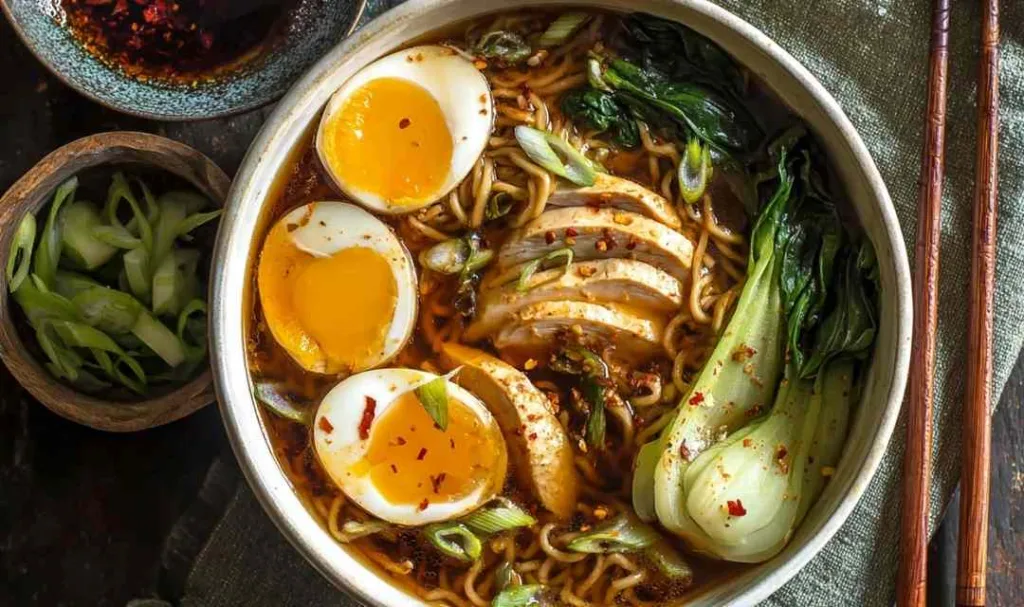Gluten free ramen noodles don’t have to come from a package filled with mysterious ingredients and enough sodium to make your ankles swell. I’ve been making this homemade version in my kitchen for years now, and let me tell you, once you taste real ramen made from scratch, those instant packets lose their appeal real quick.
I still remember the first time my grandson came home from college raving about the ramen shop near campus. He described these beautiful bowls with tender noodles, perfectly cooked eggs, and broth so flavorful it made his eyes roll back. Well, that got my wheels turning. I figured if college kids were paying twelve dollars for a bowl of noodles, I could certainly make something just as good, maybe even better, right here in my own kitchen. So I rolled up my sleeves, pulled out my Dutch oven, and got to work. What I discovered was that making restaurant-quality ramen at home isn’t nearly as complicated as folks think. You just need good ingredients, a little patience, and the willingness to build flavor layer by layer. Now this recipe sits in my rotation whenever someone needs real comfort food, the kind that warms you from the inside out and makes you feel taken care of. Time to get that broth simmering.
What Makes This Gluten Free Ramen So Special
This isn’t your typical five-minute dorm room dinner. I’ve spent years tweaking this recipe until it delivers everything you want in a bowl of ramen without the artificial junk. See, most packaged ramen gets its flavor from MSG and enough salt to preserve a mummy, but we’re taking a different approach here. We’re building real flavor from scratch using ingredients you can actually pronounce.
- Packed with genuine nutrition from protein-rich chicken thighs, fiber-filled vegetables, and naturally gluten-free brown rice noodles
- Comes together in about 40 minutes, making it perfect for weeknight dinners when you want something special without spending all evening in the kitchen
- Uses wholesome seasonings like fresh ginger, garlic, and coconut aminos instead of relying on mystery flavor packets
- Delivers authentic ramen shop taste with a rich, savory broth that’s been simmered to perfection with shiitake mushrooms
- Easily customizable to match your spice preference, dietary needs, or whatever vegetables you have sitting in your crisper drawer
I’ve served this to grandkids with picky palates and neighbors who think they don’t like “fancy” food, and every single one has asked for seconds. That’s how you know you’ve got a winner.

Ingredient Spotlight
Chicken thighs are my preferred choice for ramen because they stay incredibly juicy and tender even with longer cooking times, plus they add more flavor to the broth than chicken breasts ever could.
Sesame oil brings that nutty, toasted flavor that makes your kitchen smell like an authentic Asian restaurant. I always keep a bottle in my pantry specifically for recipes like this.
Fresh ginger is essential here, as the bright, slightly spicy flavor cuts through the richness of the broth and adds a complexity that ground ginger powder simply cannot replicate.
Coconut aminos serve as my go-to substitute for soy sauce, providing that deep umami flavor without gluten or excessive sodium that can make you retain water.
Shiitake mushrooms are the secret weapon in this broth. They release a rich, earthy flavor as they simmer that gives the soup incredible depth and makes it taste like it’s been cooking all day.
Low-sodium broth forms the foundation of our gluten free ramen noodles, and I always choose a quality brand because the broth is what carries all those beautiful flavors to every spoonful.
Brown rice noodles give us that classic ramen texture without any gluten, though you need to watch them carefully because they can turn mushy faster than wheat-based noodles.
Bok choy adds a fresh, slightly peppery crunch that balances the richness of the broth, and I love how the leaves wilt just enough while the stems stay crisp.
How to Make Gluten Free Ramen Noodles
Step 1. If you’re making soft boiled eggs, start by bringing a pot of water to a boil, then reduce to a gentle simmer before carefully lowering the eggs in with a ladle. Cook for exactly 5 minutes, then plunge them into ice water immediately to stop the cooking and give you that perfect jammy yolk.
Step 2. Heat your sesame oil in a Dutch oven over medium heat until it shimmers, then add the chicken thighs and season with paprika and cayenne pepper. Cook about 5 minutes per side until golden brown and the internal temperature reaches 165 degrees Fahrenheit. Transfer to a plate and let rest.
Step 3. Add a splash of water to deglaze the pan, using a wooden spoon or spatula to scrape up those browned bits stuck to the bottom. Those caramelized pieces are pure flavor gold that you don’t want to waste.
Step 4. Toss in the minced garlic, grated ginger, and coconut aminos, stirring constantly for about a minute until they form a fragrant paste that coats the bottom of your pot.
Step 5. Stir in the sliced shiitake mushrooms and let them cook with those aromatics for a couple minutes until they start releasing their moisture and soaking up all that ginger-garlic goodness.
Step 6. Pour in your broth, cover the pot, and let everything simmer together for 10 minutes so those mushrooms can infuse their earthy flavor throughout the liquid. This is when your kitchen starts smelling wonderful.
Step 7. Add the gluten free ramen noodles directly to the simmering broth and cook for just 2 minutes, watching for them to become tender but still have a slight bite. Brown rice noodles can go from perfect to mushy in the blink of an eye.
Step 8. Stir in the carrots, bok choy, and green onions during the last minute of cooking. This keeps them crisp-tender instead of limp and overcooked.
Step 9. Slice your rested chicken thighs into strips, and assemble your bowls by ladling the hot broth and noodles into serving bowls, then topping with chicken strips, halved soft boiled eggs, and a sprinkle of red pepper flakes if you like a little heat.
Keeping This Gluten Free Ramen Fresh
I store leftover gluten free ramen noodles by separating the noodles from the broth. This might seem like extra work, but trust me, it’s worth it. When noodles sit in liquid overnight, they soak up way too much broth and turn into a mushy mess that doesn’t taste anything like the fresh version. Keep your noodles in one airtight container and your broth with all the vegetables and chicken in another, both sealed tight in the refrigerator. They’ll stay fresh for 3 to 4 days this way.
My freezing method works well for the broth portion if you want to prep ahead. I’ll make a big batch of the seasoned broth with the mushrooms, carrots, and bok choy, then freeze it in individual portions for up to 3 months. The noodles and eggs don’t freeze well, so I always cook those fresh when I’m ready to eat. Just let the frozen broth thaw overnight in the fridge before reheating.
For the best texture, I reheat by bringing the broth to a simmer on the stovetop, adding fresh or leftover noodles, and stirring gently until everything’s heated through. The microwave works in a pinch (use 50% power and stir every minute to heat evenly), but stovetop reheating really revives that fresh-cooked quality. Add your chicken and eggs right before serving so they warm up without overcooking.

Perfect Partners for Gluten Free Ramen Noodles
- Crispy vegetable spring rolls offer a delightful textural contrast to the soft noodles and provide a crunchy appetizer that won’t fill you up before the main event
- Asian cucumber salad with rice vinegar and sesame seeds cuts through the rich broth with its cool, refreshing crunch and bright acidity
- Steamed edamame sprinkled with sea salt makes an easy, protein-packed side that fits right into the Asian-inspired meal without requiring much effort
- Roasted Brussels sprouts with garlic might seem unusual, but the caramelized edges and savory flavor complement the umami-rich broth beautifully
- Simple seaweed salad brings authentic ramen shop vibes to your table and adds beneficial minerals along with a pleasant briny flavor
- Garlic sesame green beans tie the meal together with their nutty coating that echoes the sesame oil in the ramen itself
Looking for more warming bowls? Try my high protein veggie ramen soup for a meatless option, or explore chicken ramen recipe for another take on this comfort classic. If you’re in a hurry, my easy gluten free vegan ramen comes together even faster. For something with different Asian flavors, check out my simple miso soup or authentic miso soup recipe.
FAQs
I recommend sticking with thighs because they stay much more tender and add better flavor to the broth, but if you prefer white meat, just reduce the cooking time by a couple minutes and watch your thermometer carefully to avoid dryness.
Regular soy sauce or tamari work well if gluten isn’t a concern, though you might want to reduce the amount slightly since coconut aminos are a bit milder and less salty than traditional soy sauce.
The trick is to slightly undercook them. Aim for just barely tender when you pull them off the heat because they’ll continue softening in that hot broth even after cooking stops.

Gluten Free Ramen Noodles
Ingredients
Equipment
Method
- Heat sesame oil in a Dutch oven or large skillet over medium heat. When oil shimmers, add chicken thighs and sprinkle with paprika and cayenne pepper. Cook for 5 minutes, flip, and cook another 3 to 5 minutes until internal temperature reaches 165 degrees Fahrenheit. Transfer to a plate and let rest for 5 minutes.
- Add water to the pot to deglaze the bottom, using a wooden spoon or rubber spatula to scrape up any browned bits. Add minced garlic, grated ginger, and coconut aminos. Saute until fragrant and the mixture forms a paste consistency, about 1 minute.
- Add shiitake mushrooms to the pot and stir to combine with the spice paste. Cook for 2 minutes.
- Pour broth into the pot, cover with a lid, and simmer for 10 minutes until mushrooms are soft. If using soft boiled eggs, peel them during this time.
- With the broth still simmering, add ramen cakes and cook for 2 minutes until tender but still have a slight bite. Watch carefully to avoid overcooking.
- Stir in shredded carrots, bok choy, and green onions. Cook for 1 minute to soften slightly.







